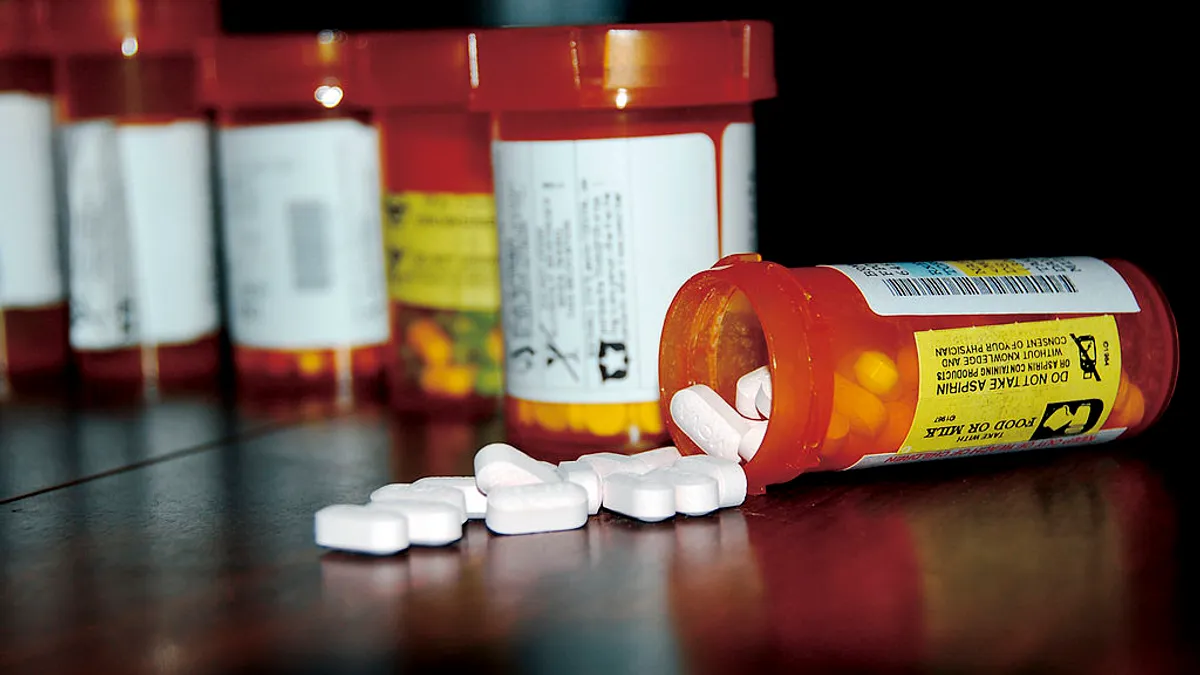Dive Brief:
- Cardinal Health, which supplies drugs to 25,000 pharmacies and 70,000 hospitals nationwide, agreed to pay the Department of Justice $44 million to settle civil penalties from a 2012 Drug Enforcement Agency (DEA) case against the company for its negligence in stemming the national opioid epidemic.
- Pharmaceutical suppliers are responsible for notifying the DEA of suspciously large or frequent orders, as part of required anti-diversion programs along the supply chain, The Baltimore Sun reports.
- The case began when an excessive amount of oxycodone in Florida, Maryland and New York was found to have originated at Cardinal's Lakeland, FL distribution site, with no reports of suspicious orders filed. A temporary suspension, legal battle and several settlements followed.
Dive Insight:
The case may be a few years old, but the opioid epidemic remains widely present, and the latest settlement — the largest yet, according to the Sun — shows the federal government's stance that the entire pharmaceutical supply chain must be held responsible for stemming the illicit distribution of prescription drugs.
Retailers like CVS Pharmacy are just one touch point, and they require active participation by drug distributors and manufacturers to maintain what is an oversupply of opioids. While it is the responsibility of pharmacists and doctors to determine true need among clients, supply chain departments have the tools available to track surges in demand even at the pharmacy level. A failure to report such suspicious activity led both Cardinal Health and CVS Health to settle with the government in this case.
Cardinal Health's response to the ruling reveals the complexity of the issue, though, as distributors face sanctions for actions taken at least one step downstream.
While the $120 billion drug distributor was careful to own responsibility in the failure of its drug diversion program, it also framed itself as a member of a chain of duty, rather than the prime force behind diversion efforts. In a statement issued by its Chief Legal and Compliance Officer, words like collaborative, partners, and participants appear prominently.
Additionally, as part of the settlement efforts since 2012, the Dublin, OH-based distributor produced a video instructing pharmacists on "red flags," both in human and written form: groups of individuals traveling together, refilling similar or common cocktail prescriptions; use of slang to describe the prescriptions needed, and both doctor and pharmacy shopping; i.e., using different doctors and pharmacies to get drugs more often. The focus was clearly on what the pharmacists must question when refilling painkiller prescriptions.
The paradox, then, is that distributors must train their supply chain partners to help stem the epidemic. Or, as this case shows, face larger losses through temporary suspensions of key facilities and legal fees by the government. A $44 million payout is unlikely to affect Cardinal's financial health, but the precedent for tougher sanctions has been set.














